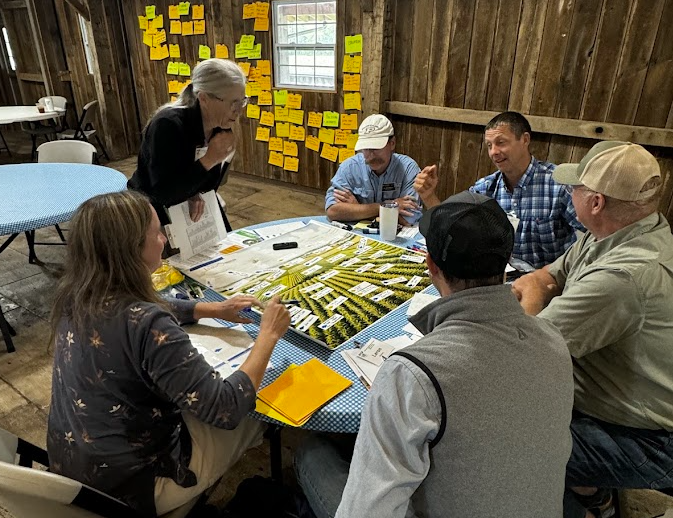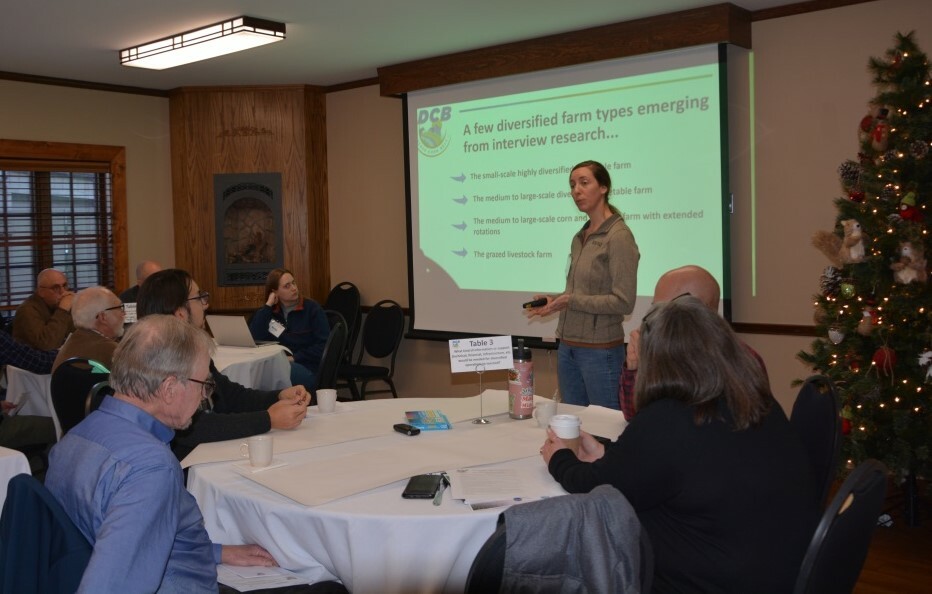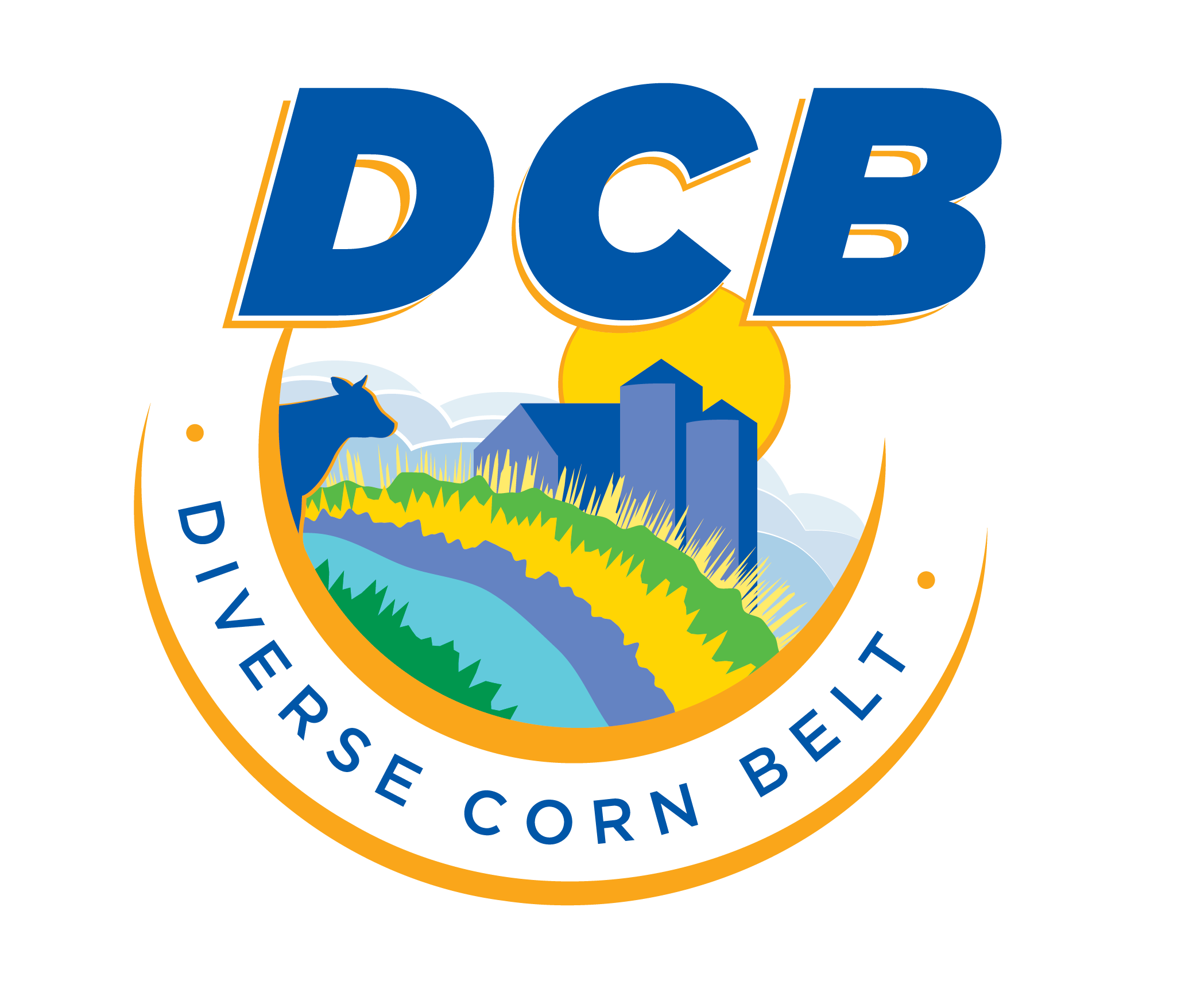When the Diverse Corn Belt Project began, we needed a baseline, a foundation for knowing what farmers thought about diversification.
In previous work, Emily Usher, DCB Project Manager, and Lauren Asprooth, a social scientist at Purdue University, had researched motivations, barriers, and incentives for implementing single conservation agriculture practices, such as cover crops, extended rotations, and nutrient management. Now, they would be examining possible changes in the agricultural system of the Corn Belt.

An AI-generated row crop landscape is the focus of lively conversation at an Indiana Reimagining Agricultural Diversity (RAD) Team Meeting. Participants were asked to view several types of AI-generated landscapes and provide feedback on the positives and challenges of producing agricultural products in that landscape.
System change, Usher says, could “advance social, economic, and biological stability and diversity.” But she and Asprooth says they couldn’t discover how to achieve these outcomes without speaking with the people currently working on the landscape.
To create a baseline for DCB, conventional and diversified farmers were invited to participate in focus groups. Across the research states of Iowa, Illinois, and Indiana, a total of 100 participants in 20 focus groups shared their insights into the benefits and challenges of diversification, as well as their vision for their own communities.
Usher says through focus groups, DCB learned from the participants “why they do what they do and how they do it.”
“This was our attempt to capture the thoughts, the dreams, the concerns of our baseline stakeholders, the farmers, who are the backbone of the agricultural community,” Usher says. “It’s important when we think about systems change to fully understand the impacts of systems change. It’s imperative to include and highlight the farmer’s voice.”
In the focus groups, participants built on each other’s thoughts, unearthing more collective knowledge than through interviews, Asprooth says.
“In interviews, people can be more open to share more personal details or things that might be vulnerable for them,” she says, “but there’s this idea of a focus group being more than the sum of its parts.”
During the discussions, farmers focused on diversity in crops, livestock, markets, and supply chains. Several focus group participants were diversifying their farms to give their children career opportunities within the operation. Sometimes, “thinking outside the box” was included in the discussion, which often included conversations on reducing risk.
Usher says farmers in the focus groups were open about the challenges of diversification, such as obtaining crop insurance. Many diversified farm products are not covered by crop insurance.
“Some people have viewed crop insurance as stifling creativity because it just enables the conventional corn and bean system,” Usher says. “Even if people want to explore outside of that system, it’s very challenging because there is no safety net like there is with a more conventional cropping system.”
On the other hand, Usher says some focus group participants created an alternative safety net by distributing risk across multiple farm products and markets.
“Diversification can provide additional stability if there are unfavorable market conditions for commodity crops,” Usher says. “Then, you still have other revenue streams.”

Lauren Asprooth, Purdue social scientist, presents on interview research at an Illinois Reimagining Agricultural Diversity (RAD) Team meeting. Part of the RAD Team meetings includes sharing findings from focus groups, interviews, and previous meetings.
From the foundational discussions in the focus groups, the DCB Team built the next phases of research for the DCB Project. Asprooth talked one-on-one with diversified farmers, using focus group information to craft her interview questions. The focus groups also informed a widely distributed farmer survey, the DCB modeling team (which creates scenarios of systems and landscapes for the future), and Reimagining Agricultural Diversity (RAD) Team Meetings.
During RAD Team meetings, agricultural stakeholders gather to discuss and create regional plans for diversification. One RAD Team per DCB state meets throughout the five-year DCB Project.
During the first RAD Team meeting in each state, DCB team members asked attendees to prioritize statements about the future. The statement began, “In the next 20 years, for the farms in my area, I would like them to ________________.” The blanks were filled with various statements about farm productivity, environmental health, economic stability, and rural communities. When RAD Team members ranked the statements in order of importance, the team learned about priorities for a broad sector of agricultural professionals.
Usher says much of the information for these statements came from what farmers said in the focus groups.
“The focus group data was the foundational, jumping-off point for the project,” Usher says. “These focus groups were a really good opportunity for us to ask simple but compelling questions and get people thinking about diversification. All of the people who participated in our focus groups were invited to participate in our RAD teams, creating networks of people who are interested in this type of work.”
Asprooth agrees and says that collecting farmer’s and other stakeholders’ stories is a “meaningful experience.” With one focus group she led with a colleague, participants were willing to share at a deeper level than they would have shared in a less direct way of gathering data, such as the farmer survey.
“On a survey, ‘What’s going to incentivize you to grow a small grain?’ they would have said, “I need cost-share,” or something like that. It would have been really cut and dry,” Asprooth says. “But the story we got from them is that they want to do the right thing. They are good people, and they’re just trying to farm the best way that they can, but they live in a system, and they work within a system that’s helping them and pushing them to do the opposite. Getting that perspective is something you can only get by sitting down with someone in a group context or in an individual context.”
The results of the focus groups were featured in the article “‘Safer to plant corn and beans’? Navigating the challenges and opportunities of agricultural diversification in the U.S. Corn Belt.”
The next RAD Team meetings will focus on markets and policies and will take place on these dates in 2025:
- Iowa: January 10, Des Moines
- Illinois: February 5, Champaign
- Indiana: February 28, Thorntown
If you’d like to be part of a RAD Team meeting and share your ideas and stories, visit our Contact Us page and send us a message. We’ll send you more information.
We’re excited to have you join the conversation!
